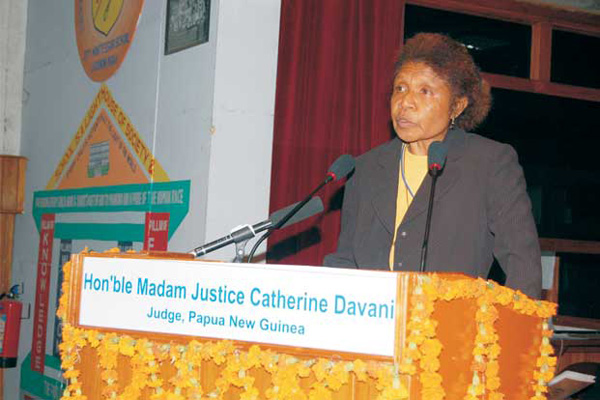Justice Davani
2009 saw the largest number of massacres. Police commanders confirmed 50 killings related to acts of sorcery, but Justice Davani believes more were not reported or recorded. According to Justice Davani, sorcery, a subject unfamiliar to most New Zealanders, “is a belief. It is deeply engrained in the emotions of people, in almost all regions of [PNG].”
Whilst sorcery was once a “localised secret and protected practice governed strictly by custom,” ranging from healing to magical powers, it is now at the cusp of abolition due to public pressure. “The Government believes that the repeal of the present Sorcery Act will somehow enhance prosecution of [sorcery killings], and eventually secure convictions.”
In February this year, 20-year-old Kepari Leniata was stripped naked and burned alive on the outskirts of the Western Highlands Capital of Mount Hagan, due to suspicions of witchcraft. Justice Davani drew attention to an editorial in a PNG newspaper, which condemned the attack and stated that the “frequency in occurrence of these barbaric acts warrants the intervention of our political leaders.”
Justice Davani, who has 28 years’ legal experience and was appointed to the National and Supreme Court of PNG in 2001, questions the move to repeal, noting that there are already “laws in place that deal with people who kill.” She remarked that the distinction between evil and innocent sorcery needed to be drawn, as in some cases it would not be necessary for the law to interfere.
Davani spoke about the dilemma faced in PNG as to whether the rights of people who are called sorcerers should in fact be properly addressed by the courts. “PNG is now at a crossroads. There is a clash of custom and western laws … although there is talk about repealing the Sorcery Act, the criminal law has always been there to deal with these serious issues.”
Davani drew attention to a case involving two men who went into a woman’s house, tied both her hands, blindfolded her, and then decapitated her using a machete. The two accused argued that the killing was justified because the woman had killed both of the men’s parents through witchcraft. The criminal law in PNG does not provide for sorcery as a defence to murder. Rather, it is a custom that the courts have to deal with. In this case, the court imposed the maximum penalty for murder – the death penalty – for what was deemed to be an “execution” or “payback killing.”
As one of 25 judges in a country of more than eight million people, Justice Davani has delivered a breadth of judgments throughout her career. She maintained that there were means to punish sorcery killings and that depriving the country of a custom so embedded in their culture may not be the best answer. “Although the Government and non-government organisations are calling for this Sorcery Act to be repealed, it is obvious that accused persons who kill persons suspected of being sorcerers and witches can be arrested and charged with manslaughter, willful murder or murder.”
The address was organised by the Otago Women’s Lawyers Society (OWLS), in conjunction with the University of Otago and the New Zealand Law Foundation.








